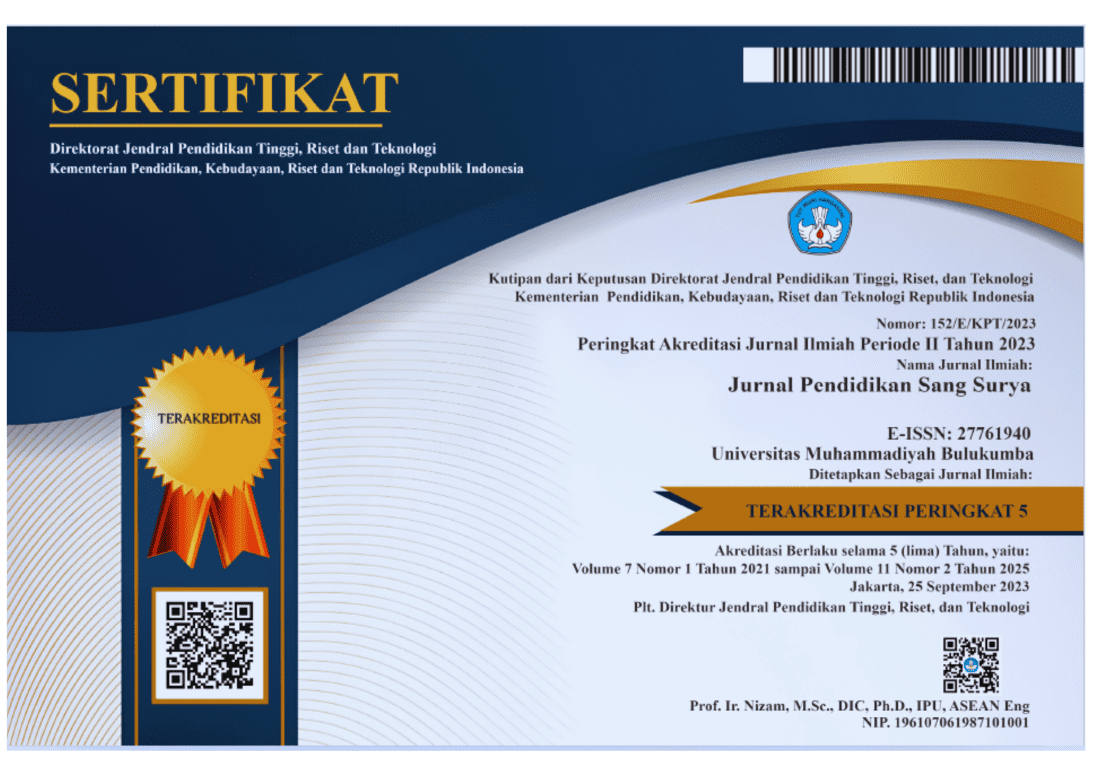PENGUASAAN KOSAKATA BAHASA INGGRIS MENGGUNAKAN PERMAINAN PICTIONARY
DOI:
https://doi.org/10.56959/jpss.v8i2.83Keywords:
Vocabolary Knowledge, English, PictionaryAbstract
This research aimed to develop students English vocabulary through the Pictionary game. This study was classroom action research in grade VII H 2nd group, SMPN 1 Tanjung Selor, consisting of 12 students. This study applied descriptive quantitative design and the data was collected using a written test. The collected data showed the students obtained the score minimum criteria of vocabulary development in the 1st circle and there was an improvement in the 2nd circle from the point 66.67 percent and 50 percent to 83.33 percent. The data analysis showed the implementation of Pictionary in English vocabulary learning could enhance students’ vocabulary and their learning outcome in grade VII H 2nd group, SMPN 1 Tanjung Selor.
Downloads
References
Afandi, M. (2014). Pentingnya Penelitian Tindakan Kelas Bagi Guru Dalam Pembelajaran Di Sekolah Dasar. Jurnal Ilmiah Pendidikan Dasar UNISSULA, 1(1), 1–19.
Ayu, R. R. (2018). The Effect of Using Pictionary Games on Students’ English Vocabulary. JPPK (Jurnal Pendidikan Dan Pembelajaran, 7(9), 1–8.
Folse, K. S. (2008). Six Vocabulary Activities for the English Language Classroom. English Teaching Forum, 46(3), 12–21. www.keithfolse.com/handouts.html% 0D%0Apapers2://publication/uuid/E6 31C21E-3327-4A8F-997A- C2F8254295A1
Imamura, K. (2012). How to Play Pictionary in School. Classroom Synonym. https://classroom.synonym.com/play- pictionary-school-8548553.html
Karam, M. (2013). How to Use Classic Games as Vocabulary Board Games for Kids. Love to Know Corp. https://boardgames.lovetoknow.com/ Games_Scrabble,_Password,_and_Pi ctionary_as_Vocabulary_Tools
Kartini, I., & Kareviati, E. (2021). the Students’ Responses Toward the Implementation of Crossword Puzzle in Teaching Vocabulary To the Seventh Grade Students in One of Junior High School in Cimahi. PROJECT (Professional Journal of English Education), 4(3), 375–383. https://doi.org/10.22460/project.v4i3. p426-432
Noge, M. D. (2019). Penerapan Model Pembelajaran Bilingual Preview- Review Berbasis E-Flashcard Untuk Meningkatkan Aktivitas Dan Prestasi Belajar Bahasa Inggris Siswa Smp. Journal of Education Technology, 2(1), 13–19.
https://doi.org/10.23887/jet.v2i1.1380 1
Noviyanti, R., & Bahri, S. (2019). The Use of Think Bingo Game to Improve Students’ Vocabulary Mastery. Research in English and Education Journal, 4. 1–8. http://www.jim.unsyiah.ac.id/READ/ article/view/11466/4776
Pourgharib, B., & Rohani, M. (2013). The Effect of Games on Learning Vocabulary. International Research Journal of Applied and Basic Sciences, 4(11), 3540–3543.
Rahayu, S., Rasmitadila, R., & Makarim, H. (2018). Penggunan Media Kartu Kata Bergambar Dalam Meningkatkan Kosakata Siswa Down Syndrome. DIDAKTIKA TAUHIDI: Jurnal Pendidikan Guru Sekolah Dasar, 5(2), 94–105. https://doi.org/10.30997/dt.v5i2.1173
Ramli, Mukminatien, N., Saukah, A., & Prayogo, J. A. (2019). Word Recognition from Speech, Syntactic Knowledge, Metacognitive Awareness, Self-Efficacy as determination for L2 Listening Comprehension. International Journal of Instruction, 12(3).
Ramli, Lulu Laela Amalia, L.A., and Mahardika, A.A. N.Y. M. (2018). What Frequency Word Level Needed to have L2 Listening Comprehension? Social Science Learning Education Journal., 3 (8). 18-20
Rokhmawati, S., & Mastuti, H. (2018). Penggunaan Instagram Untuk Meningkatkan Penguasaan Kosa Kata Bahasa Inggris. Media Penelitian Pendidikan : Jurnal Penelitian Dalam Bidang Pendidikan Dan Pengajaran, 12(2), 196–203. https://doi.org/10.26877/mpp.v12i2.3 838
Rusyda, Shirtha E., Suparman, U., Sudirman S. et al. (2014). Teaching Vocabulary Through Pictionary Game to First Grade Students of SMP Al-kautsar. UNILA Journal of English Teaching, 3 (7)
Shaptoshvili, S. (2002). Vocabulary Practice Game. English Teaching Forum, 40(2), 34- 37.
Solihati, T. A. (2016). Pengajaran Kosakata Bahasa Inggris Melalui Active Learning. Jurnal Naturalistic, 1(1), 59–71. https://doi.org/10.1136/vr.f1944
Sudrajat, H. N., & Herlina. (2015). Meningkatkan Pemahaman Kosakata Bahasa Inggris Melalui Metode Permainan Bingo. Jurnal Ilmiah Visi PPTK PAUDNI, 10(2), 114–121. https://doi.org/10.21009/jiv.1002.6
Widyahening, C. E. T., & Rahayu, M. S. (2021). Pembelajaran Kosa Kata Bahasa Inggris dengan Media Cerita Rakyat bagi Siswa Kelas V Sekolah Dasar. Jurnal Komunikasi Pendidikan, 5(1), 108–123. https://doi.org/10.32585/jkp.v5i1.913
Downloads
Published
How to Cite
Issue
Section
License
Copyright (c) 2022 Jurnal Pendidikan Sang Surya: Lppm Universitas Muhammadiyah Bulukumba

This work is licensed under a Creative Commons Attribution-ShareAlike 4.0 International License.
Jurnal Pendidikan Sang Surya dilisensikan di bawah Lisensi Internasional Creative Commons Attribution-NonCommercial-ShareAlike 4.0
Artikel di Jurnal Pendidikan Sang Surya adalah artikel Akses Terbuka yang diterbitkan di bawah Lisensi Creative Commons CC BY-NC-SA Lisensi ini mengizinkan penggunaan, distribusi, dan reproduksi dalam media apa pun untuk tujuan non-komersial saja, asalkan karya dan sumber aslinya dikutip dengan benar. Setiap turunan dari aslinya harus didistribusikan di bawah lisensi yang sama dengan aslinya.



